SAN ANTONIO – The investigational oral tyrosine kinase inhibitor neratinib showed continued benefit in terms of reduced invasive disease-free survival at 3 years of follow-up in women with early-stage HER2-positive breast cancer in the randomized, double-blind ExteNET trial, Dr. Arlene Chan reported at the San Antonio Breast Cancer Symposium.
The 3-year analysis was not prespecified. It was performed because she and her coinvestigators were concerned that the previously reported benefit seen at 2 years might be lost with longer follow-up, as has occurred with trastuzumab (Herceptin) in the landmark HERA (HERceptin Adjuvant) trial. Reassuringly, however, the absolute 2.3% benefit for neratinib compared to placebo seen at 2 years in ExteNET was maintained at 3 years in the updated analysis, where the absolute difference remained essentially unchanged at 2.1%, according to Dr. Chan, vice chair of the Breast Cancer Research Center of Western Australia in Perth.
Moreover, most patients have reached the 4-year mark in follow-up, where the invasive disease-free survival benefit has remained significant in favor of neratinib at 90.5% versus 88.6% with placebo, she added.
ExteNET was a large international trial of 2,840 women with stage II-IIIc HER2-positive breast cancer with node-positive disease who were randomized to oral neratinib at 240 mg/day or placebo for 1 year beginning an average of 4.4 months after completing adjuvant chemotherapy and 1 year of trastuzumab.
The impetus for ExteNET was the well-established observation that relapse occurs in up to 26% of trastuzumab-treated patients at 8-plus years of follow-up. The study hypothesis is that neratinib, a tyrosine kinase inhibitor of HER1, –2, and –4, will prevent or delay disease recurrence because it attacks the cancer through a mechanism of action different from that of trastuzumab.
At 2 years of follow-up post neratinib, the invasive disease-free survival rate was 93.9% with active therapy and 91.6% with placebo, as previously reported by Dr. Chan. At 3 years in the roughly 85% of patients who remained in the study, which changed sponsors in the interim, the rates were 92% and 89.9%.
The 3-year outcomes were most robust in patients who began neratinib less than 1 year after completing trastuzumab and who were hormone receptor positive. In this subgroup, the 3-year invasive disease-free survival rate was 93.3% with neratinib versus 88.6% with placebo. That, Dr. Chan said, is the scenario where delayed adjuvant neratinib might prove beneficial in clinical practice.
Patients with hormone receptor–negative disease didn’t benefit from neratinib.
Forty percent of patients on neratinib developed grade 3 diarrhea, the agent’s major side effect and one that is a class effect with the tyrosine kinase inhibitors. Most cases occurred within the first 30 days of treatment and lasted for a median of 5 days, with 1.4% of neratinib-treated patients being hospitalized for this complication.
Dr. Chan noted that the study protocol precluded prophylaxis with loperamide during the first month of neratinib, which has been shown by other investigators to markedly reduce the frequency and severity of diarrhea.
Another ExteNET follow-up is planned at the 5-year mark.
Audience members asked how the Food and Drug Administration’s approval of pertuzumab (Perjeta) with indications for neoadjuvant treatment of HER2-positive breast cancer as well as for metastatic disease will change the prospects for neratinib.
Dr. Chan replied that, like other medical oncologists, she’s eagerly awaiting the results of the APHINITY trial, which is testing adjuvant pertuzumab versus placebo on top of chemotherapy plus trastuzumab in women with HER2-positive disease.
“I would suspect that even if APHINITY is positive, there will be patients who will still have a risk of relapse, so we still won’t be curing all HER2-positive patients,” she said, adding that a new clinical trial would be required in order to establish that neratinib is of benefit in such individuals.


